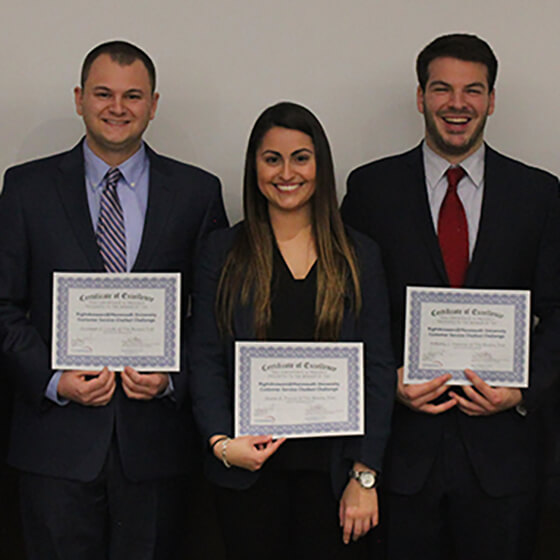Technology Could be at Forefront of Revolution in Web-based Customer Service
WEST LONG BRANCH, N.J. (Feb. 15, 2017) — Three Monmouth University students have developed a cutting-edge solution to a customer service problem to win the university’s first-ever chatbot challenge.
The competition was sponsored by RightAnswers, Inc., the Edison, N.J.-based firm recognized as a leading provider of knowledge management, enterprise search and social knowledge software and brought together students from the Leon Hess Business School and the department of Computer Science and Software Engineering.
The winning team, called Binary Trio, consisted of MBA students Anthony Vazzana of Freehold, N.J., and Nicole Puccio of Marlboro, N.J., and senior computer science major Giuseppe Lacata of Manalapan, N.J. The team shared a $1,500 cash prize from RightAnswers.
A chatbot is a computer program which conducts a conversation with a human using either speech recognition or text inputs. These programs are designed to simulate actual human-to-human interaction. Since the advent of chatbots more than a half-century ago, most of them have relied on recognition of cue words and phrases to elicit a response. Only recently, as messaging systems have grown, have chatbots been found more frequently on websites to answer consumer questions.
Jeff Weinstein, the CEO of RightAnswers who received his MBA at Monmouth University, said that chatbots were a new avenue that his firm was exploring and that since younger people are significant users of messaging, he was interested in how the students would relate to this new technology.
“From the university’s perspective,” said Weinstein, “you are able to give students exposure to what product development is really like. And for me, it helped me take the pulse of where the talent is today.”
MBA Program Director Susan Forquer Gupta was also enthusiastic about the partnership. “This competition surpassed our expectations in what [the students] were able to accomplish. The more our programs can do to prepare students with these critical skills, the better their prospects on the job market and in their careers.”
“This is what they need to do,” said Jamie Kretch, chairperson of the computer science and software engineering department. “This is life after Monmouth. The students got a chance to step out of the classroom and meet challenges, meet different people from different backgrounds and come together and work together on a project.”
“The more interactivity we have with businesses, the better it is for our students,” Kretsch said.
An important part to the competition was giving the students the opportunity and benefit of being mentored by the RightAnswers team.
“We worked to ensure a good balance between providing too much guidance and giving them practical elements to consider, so they could deliver a solid business case and product demonstration,” Weinstein said. “If we gave a team too much specific direction, that could have limited their thinking. In the end we really saw how creative they all were.”
The winning competitors all gave Weinstein and his company high marks for helping the team grow and for encouraging them to develop something that may have been outside of their comfort zone.
“I had never done a competition like this,” said Puccio. In fact, she said, she didn’t even know anything about chatbots at the outset.
It was Vazzana who urged Puccio to compete. The two MBA candidates, who also received their undergraduate degrees at Monmouth, met Lacata at an initial development meeting and decided that their backgrounds and personalities meshed well. Vazzana and Puccio also were quick to give plenty of credit to their undergraduate colleague for the ultimate success of their project.
“Giuseppe knew much more about chatbots than we did,” said Vazzana, “but it clicked when he was explaining it to me. He said, ‘You want the chatbot to be smarter than the person using it.’”
Their chatbot was designed to answer questions that a prospective Monmouth University student might have when visiting the university’s website.
“We did a lot of research when we developed the business plan,” explained Puccio, “and everything we found was that people want to use a messaging platform. They like to talk to people that way.”
“People don’t want to talk face-to-face with other people,” continued Vazzana. “They don’t want to talk on the phone. They don’t even want to send e-mail anymore. They would rather message somebody — or some thing — and have it spit back information instantly.”
As for Lacata, he thinks chatbot technology is going to grow exponentially over the next year or two. “Websites are all going to have them. It’s going to be everywhere.”
Weinstein said he hoped that developing a focus simultaneously from a business and marketing perspective and from a technology perspective would be a meaningful exercise for the participants.
Vazzana agreed. “Having to apply everything we’ve learned in the classroom in a different way — and doing it under a time crunch — was really cool because in the business world you don’t have all the time in the world to do things. There’s never a perfect time to do everything. [This competition] will prepare us more for whatever we decide to do in the future.”
Two additional teams of Monmouth students presented their chatbots in the completion of the challenge: C++ Gets Degrees (John Dixon, Mada Al-Mansour, Jasmine Walker) and Bot City (Zahra Yarahmadi, Phil DiMarco, Darius Jenkins).

